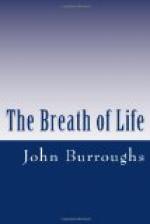No doubt but that all things in the material world are causally related, no doubt of the constancy of matter and force, no doubt but that all phenomena are the result of natural principles, no doubt that the living arose from the non-living, no doubt that the evolution process was inherent in the constitution of the world; and yet there is a mystery about it all that is insoluble. The miracle of vitality takes place behind a veil that we cannot penetrate, in the inmost sanctuary of the molecules of matter, in that invisible, imaginary world on the borderland between the material and the immaterial. We may fancy that it is here that the psychical effects its entrance into the physical—that spirit weds matter—that the creative energy kindles the spark we call vitality. At any rate, vitality evidently begins in that inner world of atoms and molecules; but whether as the result of their peculiar and very complex compounding or as the cause of the compounding—how are we ever to know? Is it not just as scientific to postulate a new principle, the principle of vitality, as to postulate a new process, or a new behavior of an old principle? In either case, we are in the world of the unverifiable; we take a step in the dark. Most of us, I fancy, will sympathize with George Eliot, who says in one of her letters: “To me the Development Theory, and all other explanations of processes by which things came to be, produce a feeble impression compared with the mystery that lies under the processes.”
V
SCIENTIFIC VITALISM
I
All living bodies, when life leaves them, go back to the earth from whence they came. What was it in the first instance that gathered their elements from the earth and built them up into such wonderful mechanisms? If we say it was nature, do we mean by nature a physical force or an immaterial principle? Did the earth itself bring forth a man, or did something breathe upon the inert clay till it became a living spirit?
As life is a physical phenomenon, appearing in a concrete physical world, it is, to that extent, within the domain of physical science, and appeals to the scientific mind. Physical science is at home only in the experimental, the verifiable. Its domain ends where that of philosophy begins.
The question of how life arose in a universe of dead matter is just as baffling a question to the ordinary mind, as how the universe itself arose. If we assume that the germs of life drifted to us from other spheres, propelled by the rays of the sun, or some other celestial agency, as certain modern scientific philosophers have assumed, we have only removed the mystery farther away from us. If we assume that it came by spontaneous generation, as Haeckel and others assume, then we are only cutting a knot which we cannot untie. The god of spontaneous generation is as miraculous as any other god. We cannot break the causal sequence without a miracle. If something came from nothing, then there is not only the end of the problem, but also the end of our boasted science.




